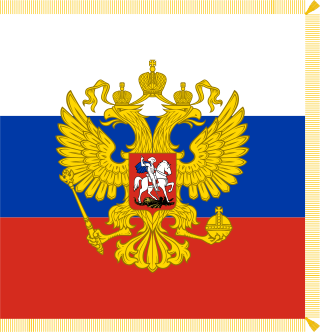
The president of the Russian Federation is the executive head of state of Russia; the president leads the executive branch of the central government of Russia and is the commander-in-chief of the Russian Armed Forces. It is the highest office in Russia.

The chairman of the government of the Russian Federation, also informally known as the prime minister, is the head of government of Russia. Although the post dates back to 1905, its current form was established on 12 December 1993 following the introduction of a new constitution.

Hero of the Russian Federation, also unofficially called Hero of Russia, is the highest honorary title of the Russian Federation. The title comes with a Gold Star medal, an insignia of honour that identifies recipients.
Rossiyskaya Gazeta is a Russian newspaper published by the Government of Russia. The daily newspaper serves as the official government gazette of the Government of the Russian Federation, publishing government-related affairs such as official decrees, statements and documents of state bodies, the promulgation of newly approved laws, Presidential decrees, and government announcements.

The Constitutional Court of the Russian Federation is a high court within the judiciary of Russia which is empowered to rule on whether certain laws or presidential decrees are in fact contrary to the Constitution of Russia. Its objective is only to protect the Constitution and deal with a few kinds of disputes where it has original jurisdiction, whereas the highest court of appeal is the Supreme Court of the Russian Federation.
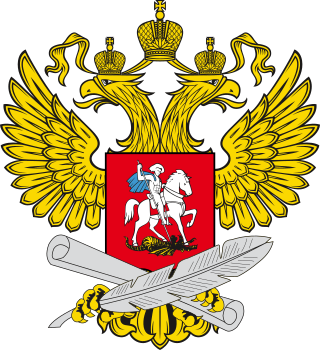
Ministry of Education and Science of the Russian Federation existed from March 2004 till May 2018. It oversaw scientific institutions, education and school accreditation in the Russian Federation. The agency had its headquarters in Tverskoy District, Central Administrative Okrug, Moscow.

The Order of Honour is a state order of the Russian Federation established by Presidential Decree No. 442 of March 2, 1994 to recognise high achievements in government, economic, scientific, sociocultural, public, sport and charitable activities. Its statute was amended by decree No. 19 of January 6, 1999 and more lately by decree No. 1099 of January 7, 2010 which defined its present status.

The State Award System of the Russian Federation has varied and distinct origins. The first being pre-1917 orders of the Russian Empire re-established after the 1991 dissolution of the Soviet Union, the second is from former Soviet orders that were slightly modified and retained post 1991, we also find many completely new awards resembling Imperial awards in basic design since the reintroduction of Russian heraldry.

The Federal Financial Monitoring Service of the Russian Federation is a Federal Service that was created by a decree of President Vladimir Putin of November 1, 2001, and aimed to collect and analyze information about financial transactions in order to combat domestic and international money laundering, terrorist financing, and other financial crimes. The organization also provides lists of people accused of terrorist or "extremist" activities and books.

The government of Russia is the federal executive body of state power of the Russian Federation. The members of the government are the prime minister, the deputy prime ministers, and the federal ministers. It has its legal basis in the Constitution of the Russian Federation and the federal constitutional law "On the Government of the Russian Federation". The Apparatus of the Government of Russia is a governmental body which administrates the activities of the government.
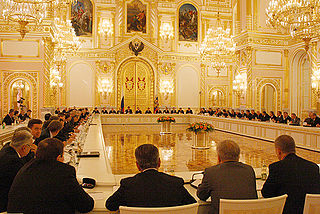
The State Council is an advisory body to the Russian head of state, which deals with issues of the highest importance to the state as a whole. The council was established by a decree of the President of Russia, Vladimir Putin, on September 1, 2000.

The Order "For Military Merit" is a military decoration of the Russian Federation established by presidential decree No. 442 of March 2, 1994 to reward military excellence. Its statute was amended three times, first on January 6, 1999, by decree No. 19, then on September 7, 2010, by decree No. 1099 which modernised the entire Russian awards system and finally on December 16, 2011, by Presidential Decree No. 1631.

The Federal Migration Service was a federal law enforcement agency of Russia responsible for implementing the state policy on migration and also performing law enforcement functions, functions for control, supervision, and provision of public services in the field of migration. The Federal Migration Service was responsible for the issuing of Russian international passports, resident registration and immigration control in Russia. Headquartered in Moscow, FMS was charged with the investigation and enforcement of over 500 federal statutes within the Russian Federation. FMS is led by a Director who is appointed by the Prime Minister of Russia.

The Russian Federation Presidential Certificate of Honour is an honorary award bestowed by the President of the Russian Federation to deserving citizens. It was established by Presidential Decree No.487 of 11 April 2008. The statute and regulations governing this award were amended on two occasions, first on 12 January 2010 by Presidential Decree No.59 and again on 14 January 2011 by Presidential Decree No. 38.

The Federal Road Transport Agency, also known as Rosavtodor, is the Russian government agency responsible for overseeing the road transport industry and transport engineering in Russia.

This article contains information about the First Cabinet of Vladimir Putin, in effect from 16 August 1999 to 7 May 2000. It was followed by Mikhail Kasyanov's Cabinet.
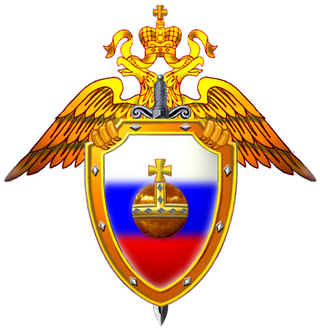
The Main Directorate of Special Programs of the President of the Russian Federation, abbreviated as GUSP is a federal executive agency that performs functions to ensure the fulfillment of the authority of the President of the Russian Federation in the field of mobilization training and mobilization in the Russian Federation. The scope of their competence is described in the Federal Law "On Mobilization Preparation and Mobilization in the Russian Federation."

The Federal Agency for Tourism (Rostourism) was a federal executive body of the Russian Federation, created by Presidential Decree No. 1453 of November 18, 2004 and dissolved on October 20, 2022. The Federal Agency for Tourism was responsible for rendering state services, managing state property and performing law-enforcement functions in the field of tourism. It was under the direct jurisdiction of the government of Russia. Activities of the Federal Agency for Tourism guided by the Constitution of the Russian Federation, Federal laws, Decrees of the President and the Government of the Russian Federation, and international treaties. The Federal Agency for Tourism carried out its activities in cooperation with other federal executive bodies, executive authorities of the subjects of the Russian Federation, local self-governing bodies, public associations and other organizations. The Federal Agency for Tourism was a legal entity, had a seal with the image of the State Coat of Arms of the Russian Federation and its name, other seals, stamp, and letterhead, as well as bank and other accounts opened. It received funding for its operation and project implementation from the federal budget. The agency head office was in Moscow.
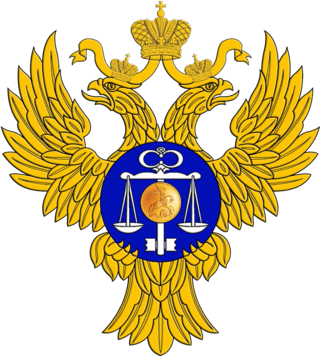
The Federal Treasury is a federal executive body, which exercises enforcement functions to ensure the execution of the federal budget, cash servicing the execution of the budgets of the budget system of the Russian Federation, preliminary and current control over the conduct of operations with federal budget funds by the main administrators, managers and recipients of the federal budget. It was created pursuant decree of the President of the Russian Federation № 1556 signed on December 8, 1992 and resolution of the Government of Russia of August 27, 1993 № 864. The Regulation on the Federal Treasury was approved by Decree of the Government of the Russian Federation of December 1, 2004 No. 703 “On the Federal Treasury”. Starting January 1, 2005, the Federal Treasury was separated from the Ministry of Finance with conversion to a federal service subordinate to that ministry and managed by it. The Treasury's headquarters is in the Apartment building of Joseph Volokolamski Compound in central Moscow.

Valentin Stepanovich Vlasov was a Russian diplomat and politician, who served as ambassador of Russia to Malta and Kyrgyzstan.

















